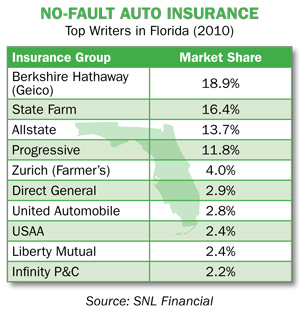 NU Online News Service, Nov. 16, 11:35 p.m. EST
NU Online News Service, Nov. 16, 11:35 p.m. EST
Another legislative battle over Florida's personal injury protection automobile insurance system is brewing, with the state's governor and chief financial officer leading the charge.
In a joint statement, Gov. Rick Scott and CFO Jeff Atwater outlined four steps to reform the no-fault law, first enacted in the early 1970s, which requires drivers to have PIP that provides $10,000 in coverage per person for medical bills, regardless of fault in an accident.
Scott said the state “must have significant PIP reform.”
The proposal from Scott and Atwater was supported by the Personal Insurance Federation of Florida (PIFF), who said reforms to the “broken system” are “long overdue.”
While the reform proposal “should encourage consumers that help is on the way,” PIFF remains “cautiously optimistic about the direction” of any PIP reform legislation, said Michael Carlson, executive director of PIFF, whose charter members include State Farm, Allstate and Progressive.
“Part of the reason Florida is in the midst of an auto insurance fraud crisis is due to timid, superficial changes which have simply pushed the problem off for decades,” he added in a statement.
PIP reform was not addressed during the 2011 Legislative Session.
A report on the no-fault law in Florida published by the National Association of Mutual Insurance Companies says the state's lawmakers have “always seemed a step behind trying to combat the latest healthcare tactics,” resulting in “runaway increases in PIP costs.
For years the industry has alleged fraud by the state's healthcare clinics, along with outrageous attorneys' fees and organized staged-accident rings to take advantage of holes in the system.
“Regrettably, our state's auto insurance system has been taken over by a circling pool of piraya—fraud clinics, lawyer referral services and organized crime—that have been making millions on the backs of every Floridian with a car in the driveway,” Atwater said in a statement.
Scott and Atwater's reform proposal includes measures to prevent fraud, and reform the role attorneys and medical providers play in the PIP system.
The Property Casualty Insurers Association of America (PCI) recently released a special report on Florida's no-fault system, concluding that false claims have cost the state's drivers more than $800 million.
The National Insurance Crime Bureau has said Florida led the U.S. in staged motor vehicle accident “questionable claims” between 2007 and 2009. Four out of the 10 U.S. cities with the highest rate of questionable auto claims are in Florida.
The report published by NAMIC was written by Jeffrey O'Connell, Peter Kinzler and Dan Miller. O'Connell proposed no-fault auto insurance in 1965 with the intent to rectify failures in the tort liability system.
However, Florida and other no-fault laws did not keep up with changes in cost-control mechanism,” the report says.
From the 2008 fourth quarter through the 2010 first quarter, PIP costs were up 40 percent and the Insurance Research Council estimates a 50 percent increase, measure to the 2010 fourth quarter.
Want to continue reading?
Become a Free PropertyCasualty360 Digital Reader
Your access to unlimited PropertyCasualty360 content isn’t changing.
Once you are an ALM digital member, you’ll receive:
- Breaking insurance news and analysis, on-site and via our newsletters and custom alerts
- Weekly Insurance Speak podcast featuring exclusive interviews with industry leaders
- Educational webcasts, white papers, and ebooks from industry thought leaders
- Critical converage of the employee benefits and financial advisory markets on our other ALM sites, BenefitsPRO and ThinkAdvisor
Already have an account? Sign In Now
© 2025 ALM Global, LLC, All Rights Reserved. Request academic re-use from www.copyright.com. All other uses, submit a request to [email protected]. For more information visit Asset & Logo Licensing.








